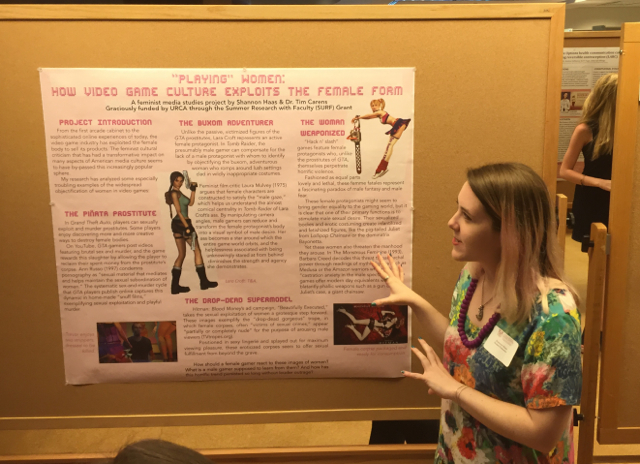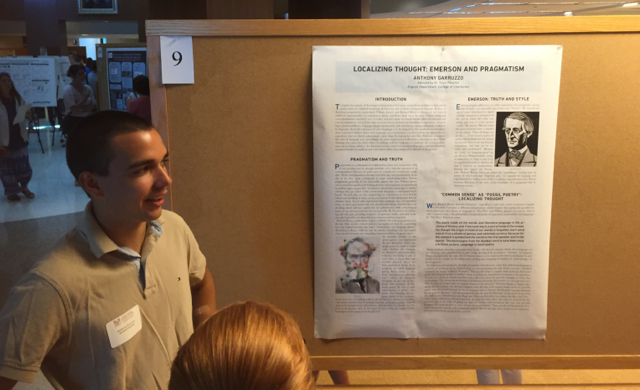Serious Summer Scholars
 This past summer, four English students received competitive Summer Undergraduate Research with Faculty (SURF) grants from the Office of Undergraduate Research and Creative Activities. These grants–which allow students to dedicate their summer months to full-time, dedicated, independent research–function as crucial gateways, intellectually and otherwise: they challenge students to reflect and research more deeply than a typical seminar during the semester might allow; they help students forge strong connections with faculty who mentor them throughout the project; and they offer students an opportunity to develop crucial skills that will distinguish them as they continue their education in graduate school or put their remarkable talents to work in the professional realm.
This past summer, four English students received competitive Summer Undergraduate Research with Faculty (SURF) grants from the Office of Undergraduate Research and Creative Activities. These grants–which allow students to dedicate their summer months to full-time, dedicated, independent research–function as crucial gateways, intellectually and otherwise: they challenge students to reflect and research more deeply than a typical seminar during the semester might allow; they help students forge strong connections with faculty who mentor them throughout the project; and they offer students an opportunity to develop crucial skills that will distinguish them as they continue their education in graduate school or put their remarkable talents to work in the professional realm.
 Shannon Haas’s (’17) research combined two of her passions: deep analysis and dedicated gaming. Her research closely examined recent video games through the lens of feminist media criticism. In particular, she studied and analyzed the ways that the video game industry manipulates and objectifies the female body, connecting these trends with existing theoretical frameworks from scholars in film studies and women’s & gender studies. This work has formed the foundation of the Bachelor’s Essay that Haas is currently writing.
Shannon Haas’s (’17) research combined two of her passions: deep analysis and dedicated gaming. Her research closely examined recent video games through the lens of feminist media criticism. In particular, she studied and analyzed the ways that the video game industry manipulates and objectifies the female body, connecting these trends with existing theoretical frameworks from scholars in film studies and women’s & gender studies. This work has formed the foundation of the Bachelor’s Essay that Haas is currently writing.
For her, however, the most meaningful aspect of this project was the chance to get to know and work closely with the works of key feminist scholars that would provide a foundation for her own critical identity: “Already a fan of Anita Sarkeesian’s work on video game studies,” Haas says, “I was particularly taken with the works of Barbara Creed, Laura Mulvey, and others.”
In addition to presenting her work locally at the annual Celebration of Summer Scholars poster session in August, the conference-length paper that was the result of her work this summer has already been accepted to be presented at two national conferences. Dr. Carens notes how valuable this kind of outcome can be: “In the spring semester, Haas will present essays at the Southeast Women’s Studies Association in Atlanta and at the Popular Culture Association in San Diego, acquiring credentials that will serve her well when she applies to Ph.D. programs next year.” For these papers, she has honed her thesis to focus specifically on what she calls the “study of the ‘hack and slash’ genre of video games and the terrifying and tantalizing heroines of these titles that represent a modern representation of the mythical and dreadful vagina dentata.“ Haas hopes to use this work in the future to illustrate to potential employers in the game-writing field that she is passionate about creating and developing games that are inclusive to everyone and that treat all characters–male and female–with respect.
Carens, who has done much to encourage student interest in undertaking such independent project, thinks that the kind of student-faculty interaction so central to these projects gets to the core of what we do at the College: “To my mind,” he explains, “the kind of independent, student-motivated work facilitated by SURF grants represents the summit of the teacher-scholar model of education. When students devise their own projects, choose their own topics, establish their own priorities they grow in ways that I don’t think are usually possible when following our syllabuses. When we mentor student-initiated projects, we really teach our students how to be scholars.
 Jozita Konczal (’17) spent her summer working on a lyric essay titled “Enough, Enough to Stay Awhile,” which began as an elegy for a lost friend. The essay, which was inspired by Maggie Nelson’s Bluets, explores love and loss, and is written in the form of a brief lyric vignettes. Konczal worked with Dr. Emily Rosko, who originally encouraged her to undertake this summer project. “I knew from the classes I had with Dr. Rosko that she is just as passionate about poetry as I am,” Konczal reflects, “and that she would guide me and my project well.”
Jozita Konczal (’17) spent her summer working on a lyric essay titled “Enough, Enough to Stay Awhile,” which began as an elegy for a lost friend. The essay, which was inspired by Maggie Nelson’s Bluets, explores love and loss, and is written in the form of a brief lyric vignettes. Konczal worked with Dr. Emily Rosko, who originally encouraged her to undertake this summer project. “I knew from the classes I had with Dr. Rosko that she is just as passionate about poetry as I am,” Konczal reflects, “and that she would guide me and my project well.”The intensive project, for Konczal, proved to be challenging, but ultimately rewarding. “At first,” she explains, “I was really worried about the strength of my work. The early stages of writing my lyric essay felt like journal entries with similes. But luckily, I’d chosen a great mentor.” With dedicated time to write every day and detailed feedback, in addition to the pile of books she was able to order with the help of the grant, Konczal started to settle into her voice. Gradually, the intent of the essay came into focus.
For Konczal, it was so especially helpful to complete a project of this length while on the brink of applying to MFA programs. “This project also clarified a lot for me about what I want to do with my future,” she notes. “I know now that I’m really interested in cross-genre work, and that’s something I want to pursue as I take steps to further my creative education.” Using the work generated over the summer as a writing sample, Konczal is looking forward to continuing to explore the potential of cross-genre work in graduate school.
According to Rosko, Konczal’s summer work allowed her to experience the challenges that all writers necessarily face: “The experience overall gave her a chance to test the boundaries of her writing,” Rosko notes. “It wasn’t easy—she struggled with finding the footing, rewrote and expanded, and then she landed in that sweet spot where the piece began to click and accelerate as the story and tropes settled into a structure. But that’s how it goes for many of us. She truly lived the writer’s life over the summer and what she created is simply luminous.”
 Victoria Rego (’18), long before Benedict Cumberbacht came on the scene, has been a fan of all things Sherlock, and a recent study abroad trip allowed her to navigate that fictional hero’s home turf. Her SURF project–“Sherlockian Shrines: The Place of Holmes in the 21st Century”–is an interdisciplinary look at the cultural phenomenon of tourism dedicated to seeking out Sherlockian haunts–sites featured in books, of course, but also the movies and TV shows that have spun out from Doyle’s oeuvre. “My project began with an inquiry into the nature of these sites and their relation to our current cultural moment,” Rego explains. “Sherlock sites attract many thousands of visitors every year and we often take literary tourism to be an unremarkable phenomenon. However, the idea that our stories could have such potency seems to be quite extraordinary.” Rego used the SURF grant to travel around the UK after the completion of my semester abroad in Spring 2016. She traveled to Sherlock sites in London, Edinburgh, and Dartmoor National Park in the very Southern England. She interviewed about 60 people from fourteen different countries–tourists, travelers, tour guides, and scholars–in order to understand this phenomenon.
Victoria Rego (’18), long before Benedict Cumberbacht came on the scene, has been a fan of all things Sherlock, and a recent study abroad trip allowed her to navigate that fictional hero’s home turf. Her SURF project–“Sherlockian Shrines: The Place of Holmes in the 21st Century”–is an interdisciplinary look at the cultural phenomenon of tourism dedicated to seeking out Sherlockian haunts–sites featured in books, of course, but also the movies and TV shows that have spun out from Doyle’s oeuvre. “My project began with an inquiry into the nature of these sites and their relation to our current cultural moment,” Rego explains. “Sherlock sites attract many thousands of visitors every year and we often take literary tourism to be an unremarkable phenomenon. However, the idea that our stories could have such potency seems to be quite extraordinary.” Rego used the SURF grant to travel around the UK after the completion of my semester abroad in Spring 2016. She traveled to Sherlock sites in London, Edinburgh, and Dartmoor National Park in the very Southern England. She interviewed about 60 people from fourteen different countries–tourists, travelers, tour guides, and scholars–in order to understand this phenomenon.
Such Sherlockian travel, she found, constitutes something like a modern literary pilgrimage; it is not merely mundane, but something intentional, sacred, and possibly transformative. As in any good pilgrimage, Rego notes, she found that travelers were engaging with a few significant themes while on the journey: “they investigated notions of modernity,” she notes, “explored national identity and international connections through the imperialistic legacy, reconnected with a personal and historical past, and enriched their inner lives.” Most importantly, she describes how her project became an exploration into the powers of narrative: “These spaces and their cultural influence are an astonishing proof of our powers as a storytelling species, that we can not only create stories, but make our fictions become reality,” she says. “Interacting with these spaces is a physical and psychological act of storytelling; it is self-creation in the purest sense. We create and travel to these spaces as an extension of our need to understand the world and our place within it.”
I met members of the Sherlock Society of London, who told me about their earliest experiences of Sherlock literature, and the strange rituals of their society’s meetings (at one meeting, a scholar performed a reverse strip tease in full Victorian garb). I saw iron age ruins on the desolate hills of Dartmoor, and interviewed a tour guide whose family lineage interwove with The famous “Hound of the Baskervilles” tale, over a Devonshire cream tea. My experiences through this project have been so varied and at time so surreal, I believe I will be writing about this experience for many years after the completion of the research project itself.
Garruzo worked with Dr. Scott Peeples, who specializes in 19th century American literature. Garruzzo notes that this made him an excellent mentor for a project about not only Emerson but the cultural context that informed his thinking. For Dr. Peeples, the experience allowed him to re-discover areas that have long been important to him: “the project I worked on with Anthony rekindled my interest in pragmatist philosophy and Ralph Waldo Emerson’s legacy as a thinker,” Peeples reflects. “I found Anthony’s intellectual curiosity inspiring.”
This was the first opportunity that Garruzzo had to commit entirely to a single research project, rather than balancing between the work of a full semester’s worth of classes. This concentrated focus, Garruzzo notes, was crucial: “it allowed me to focus on particular texts and trace the development of certain ideas well beyond what I could reasonably hope when juggling other assignments and projects,” he reflects. “I have always wished, when taking ordinary classes, that I could afford to reread everything at least three or four times so that I might not only retain but absorb the information, and in the case of this project to so reread texts was not just possible but necessary.”
The most meaningful aspect of the project, for Garruzzo relates back to his dual academic passions: “As an English and philosophy double major,” he explains, “I have always been prone to stress their overlap, insofar as they both have concerns for advancing knowledge. But I also think it is significant to hold in mind what distinguishes them as well. I learned that, while Emerson arguably does capitalize on pragmatic suspicions about how conceptually laden language truly is, there is an important difference between formulating those suspicions and artistically exploiting them.
Garruzzo hopes that recognizing this difference will help him as he moves forward toward his goal of pursuing a Ph.D. in philosophy as he continues to explore different ways, as he puts it, of “presenting and crystallizing knowledge through language.”
The account above borrows liberally from the project descriptions provided by Garruzzo, Haas, Konczal, and Rego









Comments are closed, but trackbacks and pingbacks are open.